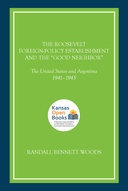Explore

The Roosevelt ForeignPolicy Establishment and the "Good Neighbor"
0 Ungluers have
Faved this Work
Login to Fave
The Good Neighbor Policy was tested to the breaking point by ArgentinaU.S. relations during World War II. In part, its durability had depended both upon the willingness of all American republics to join with the United States in resisting attempts by extrahemispheric sources to intervene in New World affairs and upon continuity within the United States foreignpolicy establishment. During World War II, neither prerequisite was satisfied, Argentina chose to pursue a neutralist course, and the Latin American policy of the United States became the subject of a bitter bureaucratic struggle within the Roosevelt administration. Consequently, the principles of nonintervention and noninterference, together with “absolute respect for the sovereignty of all states,” ceased to be the guideposts of Washington’s hemispheric policy.In this study, Randall Bennett Woods argues persuasively that Washington’s response to Argentine neutrality was based more on internal differences—individual rivalries and power struggles between competing bureaucratic empires—than on external issues or economic motives. He explains how bureaucratic infighting within the U.S. government, entirely irrelevant to the issues involved, shaped important national policy toward Argentina.Using agency memoranda, State Department records, notes on conversations and interviews, memoirs, and personal archives of the participants, Woods looks closely at the rivalries that swayed the course of ArgentineAmerican relations. He describes the personal motives and goals of men such as Sumner Welles, Cordell Hull, Henry Morgenthau, Harry Dexter White, Henry A. Wallace, and Milo Perkins. He delineates various cliques within the State Department, including the contending groups of Welles Latin Americanists and Hull internationalists—and describes the power struggles between the State Department, the Treasury Department, the Board of Economic Welfare, the Caribbean Defense Command, and other agencies. Of special interest to students of contemporary history will be Woods’s discussion of the careers and views of Juan Peron and Nelson Rockefeller—for American policy contributed in no small way to Peron’s rise, and Rockefeller was the man chiefly responsible for the U.S. rapprochement with Argentina in 1944–45. Woods also gives special attention to the impact of the Wilsonian tradition—especially its contradictions—on policy formation. The last chapter, dealing with Argentina’s admission to the U.N., sheds some light on the origins of the Cold War.Wood’s investigation of the Argentine problem makes a significant contribution toward the understanding of U.S.Latin American relations in the era of the Good Neighbor Policy, and provides new insights into the evolution of hemispheric policy as a whole during World War II. It reflects the growing emphasis on bureaucratic politics as a principal determinant of U.S. diplomacy.
This book is included in DOAB.
Why read this book? Have your say.
You must be logged in to comment.
Rights Information
Are you the author or publisher of this work? If so, you can claim it as yours by registering as an Unglue.it rights holder.Downloads
This work has been downloaded 28 times via unglue.it ebook links.
- 28 - pdf (CC BY-NC-ND) at Unglue.it.
Keywords
- diplomacy
- thema EDItEUR::J Society and Social Sciences::JP Politics and government::JPS International relations::JPSD Diplomacy
Links
DOI: 10.1353/book.84346Editions

